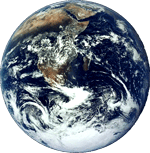Note: Donella Meadows died on 20 Feb. 2001. The following is excerpted from her story about writing The Limits to Growth in 1972. Limits was translated into 26 languages and sold more than 9 million copies.
COMPUTER PREDICTS WORLD COLLAPSE
I was one of the team of people at MIT who wrote a book that created a worldwide burst of media foreboding. It began as a small report. Within a few months we were reading headlines like the one above with complete astonishment.

We didn’t think we had written a prediction of doom. We had intended to issue a warning, but also a vision. We saw, with the help of the computer, not one future but many, all possible, some terrible, some terrific.
In the introduction to The Limits to Growth, we listed three main conclusions, one of danger, one of hope, and one of urgency. The press picked up only the first and the third:
- If the present growth trends in world population, industrialization, pollution, food production, and resource depletion continue unchanged, the limits to growth on this planet will be reached sometime within the next 100 years.
- It is possible to alter these growth trends and to establish a condition of ecological and economic stability that is sustainable far into the future.
- If the world’s people decide to strive for this second outcome rather than the first, the sooner they begin working to attain it, the greater will be their chances of success.
You wouldn’t think such simple conclusions would stir up much of a fuss, but the fuss was incredible. The storm went on for years. It inspired conferences, studies, books of denial, and books of affirmation and elaboration. Eventually, like all media-generated storms, this one settled back down.
Later, people who remembered Limits began asking me: Is this it? Are we running into the limits to growth? Were you right after all?
The question “Were you right?” bothered me. It is the wrong question. One can only be right or wrong if one has made a prediction. We didn’t do that. We offered a choice, and people heard a pronouncement of doom.

Are we pushing the limits?
Photo: NREL/PIX.
Since we wrote Limits, the human economy has more than doubled its physical presence, from vehicles to electric power plants to garbage. At the same time, there has been great erosion of the planetary resource base. Species, forests, wetlands, soils, and habitats have been lost, buffers and degrees of protection have decreased, options have narrowed.
I have spent the past 20 years immersed in statistics that describe this decline. I’ve watched them unfold. I’ve presented them to classes and to audiences many times and in a calm tone of voice. I haven’t cried over them. I haven’t yelled in outrage.
That’s because of psychic numbing, I’m sure. I haven’t been hit all at once, as I was the first time I saw the birth-rate graph. Watching the numbers slowly get worse is like watching a child grow up — or a better analogy would be watching someone die of a wasting disease.
Exponential growth of population and physical capital, exponential depletion of resources and degradation of the environment are not necessary to the human condition. But collectively we have been behaving as if they were. Growth is still the pattern of the human system. As yet no corrective processes have been strong enough to stop it. But there are signs of such processes. The good news is that some are coming from human ingenuity and restraint. The bad news is that some are coming from environmental breakdown.

There is a bright side.
Photo: NREL/PIX.
I’ve grown impatient with the kind of debate we used to have about whether optimists or the pessimists are right. Neither are right. There is too much bad news to justify complacency. There is too much good news to justify despair.
I am not afraid of the challenge of easing the throughput of human society back down within its limits — I think that can be done fairly easily and even with considerable benefit to the human quality of life. I am afraid of what the world might do with the idea that we are beyond the limits. I have already experienced the hostility, denial, and ridicule engendered by the idea that there are limits. I would expect more of the same from the idea that those limits are already exceeded.
Even worse than denial or ridicule would be simpleminded, uncritical, hysterical acceptance. I can see the headlines now:
BEYOND THE LIMITS: COLLAPSE IS COMING
or
BEYOND THE LIMITS: POPULATION, STANDARD OF LIVING MUST BE CUT
Those are the two worst possible conclusions to jump to. The first confuses trend with destiny again, leaps at prediction, denies choice. The second recognizes only the most dramatic, conflictual, and violent of the possible responses to a state of overshoot.
To ease my fear, to set the record straight, to forestall the destructive headlines, let me write my own headlines in even larger type:
OVERSHOOT DOES NOT MEAN COLLAPSE
and
MATERIAL AND ENERGY THROUGHPUT MUST BE CUT, BUT NOT PEOPLE, NOT LIVING STANDARDS, NOT THE DREAM OF A BETTER WORLD


